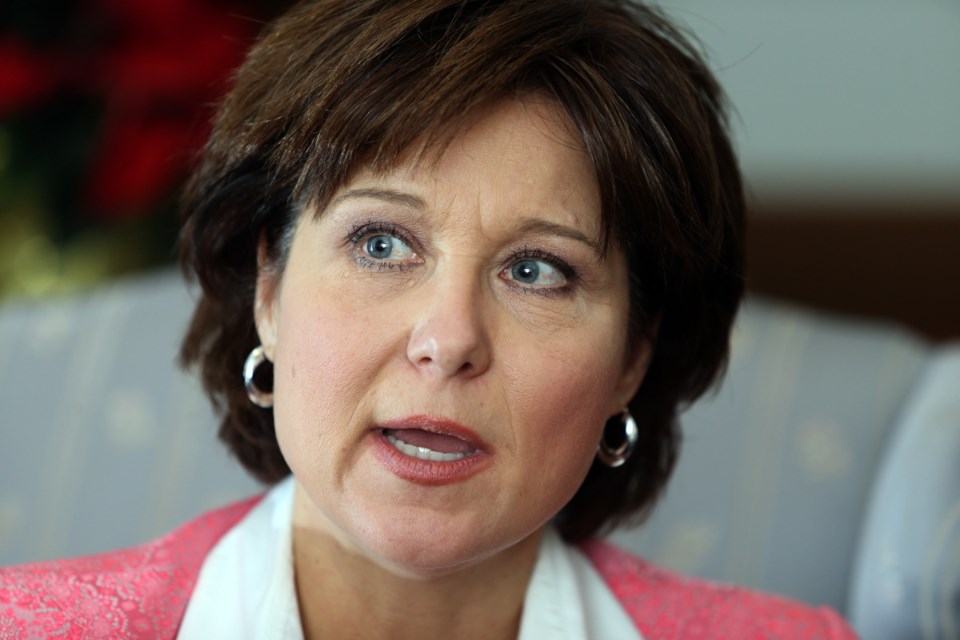From fighting back enemies in her own party, to staging one of the most remarkable comebacks in B.C.’s political history, Premier Christy Clark ended a tumultuous 2013 by pausing for a moment to relish beating the odds.
“There is something satisfying in proving your critics wrong,” Clark said in a year-end interview with the Times Colonist.
“No matter where you are in your life, we’ve all felt that at some point where somebody has said, ‘You can’t succeed at this,’ and you say, ‘I’m going to stick with it, thank you, with dogged determination,’ and you succeed anyway.
“There’s something in that, for sure.”
For many political watchers, it was hard to fathom a 2013 that closed with Clark as premier.
Beset by a cantankerous cast of Liberal MLAs, some of whom worked to undermine her leadership, Clark started the year struggling to pass her spring legislation.
One of her most trusted lieutenants was forced to resign in an ethnic outreach scandal, and Clark seemed dogged by several months of bad news, apologies and barely concealed infighting.
“It’s like you are lost in the woods and you get up and you think, ‘OK, the only way I’m going to get to where I need to go is by walking. I’m not exactly sure I’m going in the right direction, but I am going to keep moving, damn it.’ So there were a few days like that.”
Half the caucus wasn’t convinced she had the right plan to win the May provincial election, Clark now admits.
“There were some days I was being pretty publicly attacked by our own caucus members,” she said.
“Some of them seemed to want to get rid of me more than they wanted to get rid of the NDP. That’s not easy to deal with.”
But she survived the spring, shook off the unsupportive MLAs, and hit the campaign trail with a new team.
Political pundits and the media gave her virtually insurmountable odds. Pollsters put her more than 20 points behind the NDP’s Adrian Dix.
But they were all too blinded by the narrative of the death of the Liberals to see when the tables started to turn, she said.
“For me, every day out there on the campaign trail it got better. Every day the mood got brighter, the crowds got bigger, the enthusiasm got stronger. And nobody reported that throughout the campaign. I was asking myself why.”
When the polls closed the evening of May 14, Clark said she knew she had won within minutes of the first results.
“What was surprising to me was, here we were five minutes in [to election results] and we knew we were going to win,” she said. “It was dead certain. And the pundits on TV were sitting there with their jaws dropping.”
The Liberals had not only pulled off a stunning come-from-behind victory, but the party strengthened its fourth-term majority by picking up four extra seats.
The premier admits that bought her a lot of newfound respect, both among colleagues and her provincial counterparts across the country.
“There were a lot of people who felt I had to prove myself and I hadn’t,” Clark said.
“Winning an election is certainly one way of surprising everyone, too. Beating the odds. I think I proved myself to a lot of people that felt like they weren’t prepared to believe in me because they didn’t know that I could succeed.”
The 48-year-old premier said the challenge now is to follow through on what she promised in her campaign — mainly, grow a liquefied natural gas industry, generate jobs and pay down the province’s debt.
“I’ve got to deliver on what I said I was going to do. I proved I could win the election, and I proved we could balance the budget and set out a plan and stick with it, but I’ve got another four years to keep proving.”
She now tackles that task with a group of loyal MLAs she describes as more focused and hungrier than her last caucus.
And as to her detractors, who questioned her ability to lead and whether she could win a provincial election?
“Who?” Clark said, laughing. “I haven’t heard from them since.”
Sunday in the Times Colonist: What a difference a year makes
Adrian Dix was seen as the man to beat in the May election. Now he’s preparing to give up the leadership of the B.C. NDP. Times Colonist reporter Rob Shaw talks with the man once pegged as B.C.’s next premier.



